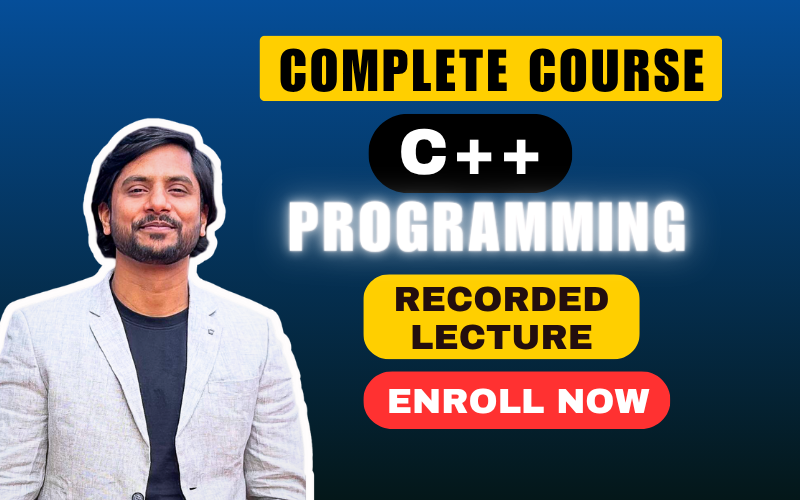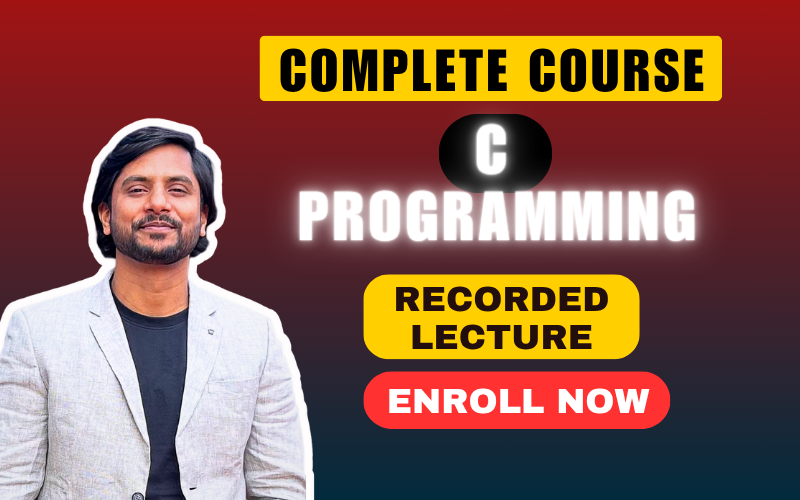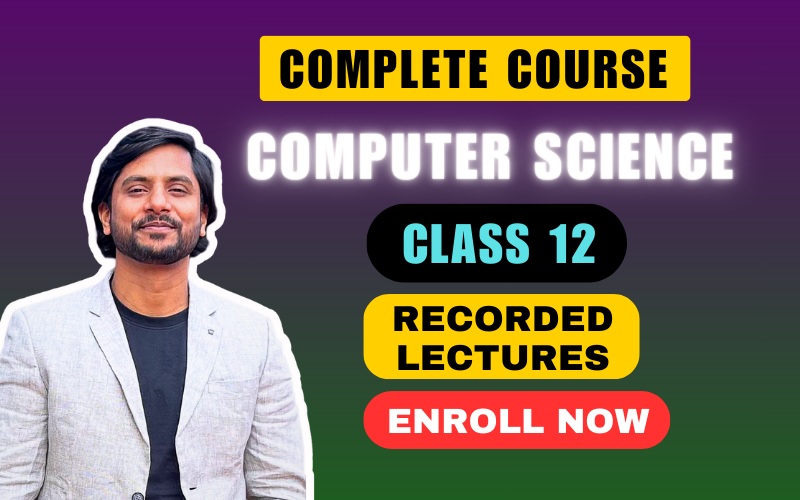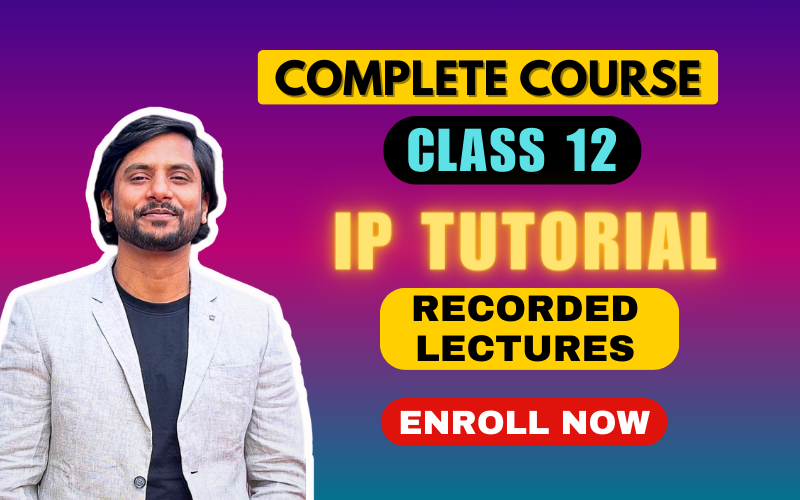
Complete C++ Programming Online Class Recorded Video Lecture Course By Anand Sir

Instructor role
What Will You Learn?
About This Course
C++ is a powerful, general-purpose programming language that combines the efficiency and low-level control of C with the advanced features of Object-Oriented Programming (OOP). At the bachelor’s level, C++ is introduced not only as a programming language but also as a foundation for understanding the principles of computer science such as data abstraction, modularity, memory management, inheritance, and polymorphism.
This course provides students with both theoretical concepts and practical programming skills, preparing them for advanced topics in software development, data structures, system programming, and competitive coding.
Learning Objectives
- By the end of this course, students will be able to:
- Understand the syntax and semantics of C++.
- Apply control structures, operators, and functions to solve computational problems.
- Design and implement classes and objects following object-oriented programming principles.
- Demonstrate the use of constructors, destructors, inheritance, and polymorphism in program design.
- Apply operator overloading and templates to write reusable and efficient code.
- Use file handling and exception handling for building robust programs.
- Develop the ability to analyze, design, and implement medium-scale applications in C++.
Teaching Methodology : Hands-on coding practice in C++ IDEs (Turbo C++, Code::Blocks, Dev-C++, or modern compilers like g++ in Linux)
📘 Table of Contents – C++ Programming
Unit 1: Fundamentals of C++
1. Introduction to C++
1.1 History and Features of C++
1.2 Structure of a C++ Program
1.3 Tokens in C++
• Keywords
• Identifiers
• Literals (Integer, Floating, Character, String, Boolean)
• Punctuators
2. Operators & Writing First Program
2.1 Types of Operators in C++
• Arithmetic Operators
• Relational Operators
• Logical Operators
• Assignment Operators
• Increment/Decrement Operators
• Conditional (Ternary) Operator
• Bitwise Operators
• Special Operators (sizeof, comma, pointer, etc.)
2.2 Writing First C++ Program
2.3 Introduction to C++ IDEs (Turbo C++, Code::Blocks, Dev-C++, VS Code, etc.)
3. Skeleton of a C++ Program
3.1 Structure of Header Files and main() Function
3.2 Input/Output in C++ (cin, cout)
3.3 Writing Basic Programs (Hello World, Simple Math, etc.)
________________________________________
Unit 2: Object-Oriented Programming Basics
4. Introduction to Class & Object
4.1 Class Declaration and Definition
4.2 Defining Objects
4.3 Access Specifiers: public, private, protected
5. Programming with Class & Object
5.1 Data Members and Member Functions
5.2 Defining Member Functions Inside and Outside Class
5.3 Example Programs
6. Static Members
6.1 Static Data Members
6.2 Static Member Functions
6.3 Program Examples
7. Friend Functions
7.1 Syntax and Declaration
7.2 Accessing Private Members Using Friend Function
7.3 Example Programs
8. Functions in OOP
8.1 Object as Function Argument (Call by Value, Call by Reference)
8.2 Function Overloading
• Rules of Function Overloading
• Examples
________________________________________
Unit 3: Constructors & Destructors
9. Constructors in C++
9.1 Introduction to Constructors
9.2 Types of Constructors
• Default Constructor
• Parameterized Constructor
10. Special Member Functions
10.1 Copy Constructor
10.2 Destructor
10.3 Program Implementation
________________________________________
Unit 4: Inheritance
11. Introduction to Inheritance
11.1 Concept of Reusability
11.2 Syntax of Inheritance
12. Single Inheritance
12.1 Base and Derived Classes
12.2 Example Programs
13. Multiple Inheritance
13.1 Syntax and Implementation
13.2 Example Programs
14. Hierarchical & Hybrid Inheritance
14.1 Hierarchical Inheritance
14.2 Hybrid Inheritance
14.3 Program Examples
15. Advanced Inheritance Concepts
15.1 Ambiguity in Inheritance
15.2 Virtual Base Class
15.3 Constructor in Base Class
________________________________________
Unit 5: Polymorphism & Operator Overloading
16. Polymorphism
16.1 Types of Polymorphism (Compile-time & Run-time)
16.2 Constructor Overloading
16.3 Introduction to Operator Overloading
17. Operator Overloading – Part I
17.1 Overloading Arithmetic Operators (+, -, *, /)
17.2 Example Programs
18. Operator Overloading – Part II
18.1 Overloading Increment/Decrement Operators (++, --)
18.2 Overloading Assignment Operator (=)
18.3 Other Operators
19. Program Practice
19.1 Adding Two Times (Example Problem)
19.2 Repeated Practice Programs
________________________________________
Unit 6: File Handling & Exception Handling
20. Future Guide to Students
20.1 Best Practices in C++
20.2 Career Path & Advanced Learning
21. File Handling – Part I
21.1 Streams in C++
21.2 Input and Output with Files
21.3 Opening and Closing Files
22. File Handling – Part II
22.1 Writing Data to Files
22.2 Reading Data from Files
23. File Handling – Part III
23.1 File Modes and Flags
23.2 Error Handling in File Operations
24. Introduction to Exception Handling
24.1 Errors vs Exceptions
24.2 try, catch, throw in C++
25. Programs with File Handling
25.1 File-based Programs (Student Records, Simple Database, etc.)
26. Exception Handling Programs
26.1 Example Programs Using try-catch
26.2 Nested try-catch
________________________________________
Unit 7: Advanced Topics
27. C++ Templates
27.1 Function Templates
27.2 Class Templates
27.3 Template Specialization
27.4 Example Programs
Requirements

Trusted Companies
+3200 Companies trusted our courses for their staff tutoring
FAQ
Check the frequently asked questions about this course.

Curriculum Overview
This course includes 8 modules, 27 lessons, and 0 hours of materials.
Basic introduction to C++ programming and the building blocks of C++ syntax like tokens, keywords, identifiers, literals, and punctuators.
Explanation of various operators and walk through of writing and running your first C++ program using popular IDEs.
Understanding the structure of a standard C++ program and practising with simple code examples.
Concepts of Object-Oriented Programming (OOP) introduced with the basics of classes and objects.
Concept of class and object in C++ are explained in this video
Covers how static members work in C++ and how they are shared among all objects of a class.
Explains the use of friend functions to access private members of a class from non-member functions.
How to pass objects as arguments and the concept of function overloading for multiple functions with the same name.
Detailed explanation of constructors and their types for initializing objects.
Introduction to copy constructors used in object copying and destructors for cleanup.
Basic concept of inheritance in OOP, allowing one class to derive properties from another.
Implementation and explanation of single inheritance where one class inherits from another.
Shows how a class can inherit from more than one class and handles related complexities.
Explanation of multiple forms of inheritance like hierarchical (one base, many derived) and hybrid (combination).
How to resolve ambiguity in multiple inheritance using virtual base classes and base constructors.
Introduction to polymorphism in C++ and overloading of constructors and operators.
Shows how to redefine basic arithmetic operators for user-defined types.
Extends operator overloading to increment, assignment, and more.
Hands-on example of operator overloading to add time objects or duration.
Advice and direction for learners on how to proceed with advanced C++ and career planning.
Introduction to file handling: opening, writing, and closing files in C++.
Reading from files, working with file streams and file modes.
More advanced file operations and structured file reading/writing.
Application of file handling concepts in real programs (possibly a mislabeled duplicate day).
Basics of exception handling to catch and handle runtime errors safely.
Examples and practice programs using exception handling in different scenarios.
Introduction to templates for writing generic and reusable code.
Course Certificate

Course Specifications
Get Cashback
Send Course as Gift














Reply to Comment